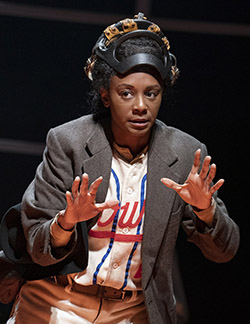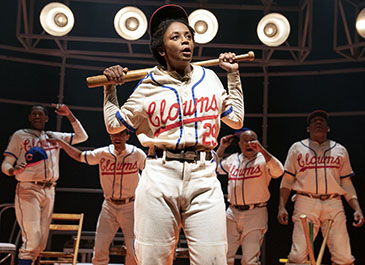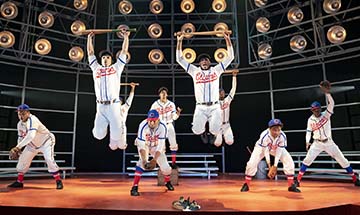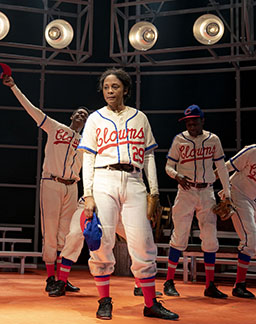By Lucy Komisar
In the 1920s, an original, a young black woman with a fanatical devotion to the quintessential American sport, fought racism and sexism to become the first woman to play in professional baseball as a regular on a big-league team. She played in the Negro Leagues.

April Matthis gives a standout performance as Toni Stone, making you want to cheer and pump your fists as she knocks down barriers. Playwright Lydia Diamond, director Pam MacKinnon and choreographer Camille Brown, an all-woman star team, turn the quirkiness of the characters and the situation into a realistic and exceptionally entertaining narrative, from Toni‘s childhood through her time as a prominent sportswoman, who you probably never heard of.
Stone was born in West Virginia and the family moved to St. Paul, Minn., when she was 10. It makes me wonder about Matthis‘ thick southern accent, but maybe that‘s due to a family that never lost it.
She is strong, not just in her arm, but in her will. She is a feminist when it comes to herself, her dreams, never putting herself second to any man. She is astonished as a young girl when another girl who is “supposed to be a good influence or some such. And what I‘m trying to say is, she talk about boys like without them a piece of her is missing.”
As a child, she can‘t sit still in church. And she doesn‘t like the idea of people of other religions going to hell. She remarks, “it just wouldn‘t make sense for them to have to be in hell with the people that hate and kill people who look like me.”
When her parents try to get her off baseball and send her to figure-skating classes and track, she comes home with trophies. She hangs onto a fence to listen in Gaby, white coach of a kids‘ group, strategizing about pitching. He chases her away.

But she goes back to the diamond. For her, baseball is poetry. Her opening monologue is about the ball, “The weight of it in my hands.” “I‘m telling you about reaching.” That will be physical and symbolic. She says, “I am prone to rambling,” but the rambles are incisive.
The set (by Riccardo Hernandez) is constructed from the iconic elements of a stadium: around the top and sides are large lights of the sort that light night games, on a wood stage are three sets of three-tiered bleachers.
Stone‘s quirkiness helps her navigate the shoals of life. She is literal and does not get diverted. It means she doesn‘t understand when a man is coming on to her. When one of the players says, “I wouldn‘t throw you outta my bed for eating crackers,” she replies, “Why would I eat crackers in your bed? Why would anyone eat crackers in a bed? They are very messy.”
Sometimes the players move in the dugout or though an imaginary field in a dance, twirling bats, jumping over them. The smart choreography is by Camille A. Brown.

As a player getting attention, and a charmer in her own way, she is courted by a businessman who has money and a house, but she tells him in so many words he is not at the top of her agenda.
When she joins the Indianapolis Clowns, the white owner (with a James Stewart accent) wrangles over pay and pushes back when he forces her to take soft pitches.
My favorite of her teammates was the very funny King Tut (a terrific Phillip James Brannon), based on a real person. Part of the Clowns‘ appeal was their hokey routines and King Tut was one of the most famous comedians in the Negro League. Spec Bebop (the very good Daniel J. Bryant) was his sidekick. Spec totes books and repeats famous phrases from Frederick Douglas, Harriet Tubman, and Ida B Wells.
Stretch (Eric Berryman) is a serious guy who takes a portion of the boys‘ pay to send to their families. Her teammates weren‘t all so nice. Woody (Ezra Knight), a nasty older guy, is humiliated by Toni on the field and savages her with sexual threats.

She deals with the difficulties of the tours, the smelly buses, often no place to eat or sleep in the segregated South except the homes of local supporters or even bordellos. In one, she becomes friends with Millie (Kenne E. Head), a prostitute, her first female friend, who gives her sisterly advice on clothes, hair and men.
Some of the games had black and white teams competing, and we hear the screaming taunts and racist insults from local whites when the Clowns have bested their players. In such situations, after the game they race to the bus.
Stone takes a year off after marrying her smitten suitor and even learns to cook, but she won‘t take orders from him. Of course, she goes back to the game.
It‘s a compelling story, funny, moving, a bit sad when you know what might have been had she been white and male. But making the best of what she had, she spun it into gold. So did the playwright and director.
“Toni Stone.” Written by Lydia R. Diamond based on the book Curveball, The Remarkable Story of Toni Stone by Martha Ackmann, directed by Pam MacKinnon, choreographed by Camille A. Brown. Laura Pels Theatre, 111 West 46th Street (between 6th and 7th Avenues), New York City. 212-719-1300. Opened June 20, 2019; closes Aug 11, 2019. Running time 2:10. 7/10/19. Also on NY Theatre Wire.

